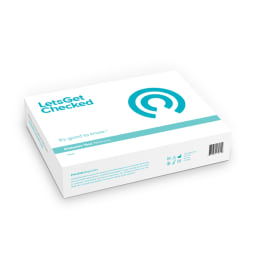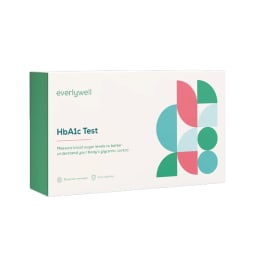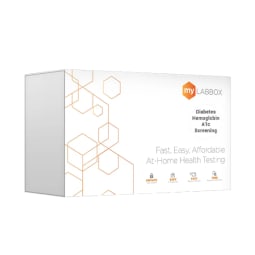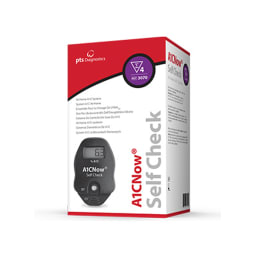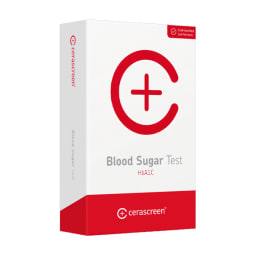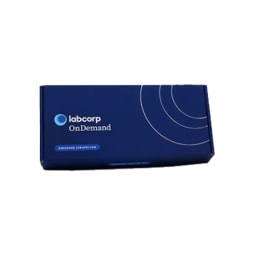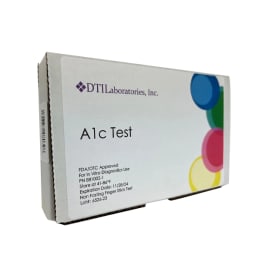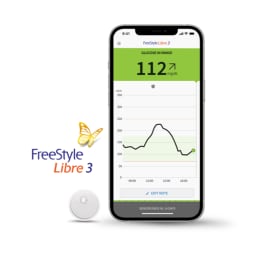Advertisement
The 8 Best A1C Home Tests Of 2023 + Who Should Use Them, From A Registered Nurse


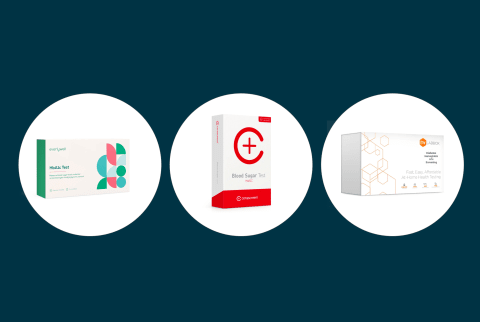
- Best for detailed results: LetsGetChecked Diabetes Test
- Best customer satisfaction: Everlywell HbA1c Test
- Best FDA-approved: myLAB Box At-Home Diabetes Hemoglobin A1C Screening Test
- Best A1C monitor: PTS Diagnostics A1CNow SelfCheck Monitor
- Best follow-up care: Cerascreen HbA1C Test
- Best for in-person testing: Labcorp Diabetes Risk (HbA1C) Test
- Best for fast results: DTI Laboratories A1C Test
- Best continuous glucose monitor: FreeStyle Libre 3
High blood sugar is increasingly common among adults in the United States. In fact, 37.3 million people have diabetes—that's 1 out of 10 people. This number more than doubles for individuals 18 and older who are prediabetic. Unfortunately, many of these cases are going undetected. The best A1C home tests can help detect blood sugar imbalances to prevent further health issues.
Spencer Kroll, a cholesterol management and lipid specialist, recommends that anyone at risk of diabetes or other blood sugar problems should check their A1C levels every three months. Keep reading to learn more about your A1C, why it's important to test your blood sugar levels regularly, and our picks for some of the best A1C home test kits available on the market.
What is your A1C?
A1C measures a sub-form of hemoglobin, which carries oxygen in your blood throughout your body. Sugar becomes attached to the A1C molecule and with high blood sugar, the A1C portion of hemoglobin also rises. Having elevated A1C can cause health concerns, such as diabetes.
The term A1C test refers to a blood test used to measure the amount of glucose, or sugar, linked to the hemoglobin in your blood. "An excessive presence of this linkage in the blood indicates diabetes or prediabetes," says Casey Kelley, family doctor and specialist in integrative medicine.
Typically, A1C measures blood sugar levels over the past three months. It's common for doctors and health care providers to use an A1C test to check if you're prediabetic or to manage Type 1 and 2 diabetes. Other names for an A1C test include hemoglobin A1C, glycated hemoglobin, or a glycohemoglobin test.
At a doctor's office, a phlebotomist will conduct these tests. Like other blood tests, blood is drawn from your vein and sent to a lab to be analyzed. An alternative way to check your A1C is to provide a sample through an at-home finger-prick test.
What does your A1C affect?
Your body requires fuel and energy to function properly. Put simply: You get that energy through the food and drinks you consume. Ideally, your body will regulate healthy blood sugar levels through the production of insulin, a hormone produced by your pancreas.
In some cases, your pancreas doesn't make enough insulin, or your body isn't able to use it properly. If your body is unable to regulate your blood sugar, it can lead to diabetes.
What are normal A1C levels?
There isn't a one-size-fits-all target when testing your A1C. Several factors impact your result, such as your age and family history of high blood sugar or diabetes. When you receive your A1C test results, it will be given as a percentage. A higher percentage means a higher blood sugar level over the last two to three months.
Ideally, adults will have an A1C level below 5.7%. This means your blood sugar levels are normal and in a healthy range. If your results show a range from 5.7% to 6.2%, this indicates you may have prediabetes. "It is in this range that a person's pancreas is probably making more insulin to compensate for increased carbohydrate intake," Kroll says. Anything over 6.2% indicates having diabetes.
How does an A1C home test work?
Many A1C home test kits are available to order through your local pharmacy or online retailers. Finger-prick tests are the most common form of at-home tests. They're easy to use and relatively painless. At-home finger-prick test kits include all the necessary equipment to collect your blood sample, such as a lancet and blood collector.
If this is your first time using a finger-prick test, be sure to read the instructions carefully or reach out to a doctor who can help you through the process. In general, you'll prick your finger, collect a blood drop into the collector, and insert it into a testing cartridge. This cartridge will mix your blood with a testing solution and determine your results.
Depending on the type of test, your results could be ready in just a few minutes. Other tests may require you to mail in your test to be analyzed by health care professionals. Most labs provide results by mail or an online portal, with an average seven-day wait time.
If you've already been diagnosed with diabetes, your doctor may suggest A1C tests periodically—every three to six months—to help manage your blood sugar levels. At-home tests are a great option to still get tested and keep track of your sugar levels when you're unable to visit a doctor's office.
Who should use an A1C home test?
If you've already been diagnosed with diabetes, it's likely you've spoken with your doctor about how often you should test your A1C. In most cases, doctors recommend getting tested at least twice per year, if not more. Since most A1C tests measure your blood sugar level over the last three months, you may be asked to get tested three to four times a year.
If you exhibit any of the following common symptoms or lifestyle factors, it could be a good idea to test your A1C:
- Overweight or obese
- Over 35 years old
- Family history of diabetes
- Lack of physical activity
A1C home tests are a convenient way to measure your blood sugar without making a trip to your doctor's office. If you're unable to see your doctor in person, either due to a scheduling conflict or financial circumstances, testing at home can still provide accurate results and help you maintain healthy blood sugar levels.
It isn't necessary to test your A1C if you do not exhibit the typical symptoms related to diabetes. "As a good rule of thumb, when you reach the age of 45, it's a good idea to get an A1C to ascertain your baseline," Kelley explains.
Although it's not necessary to test your A1C if you don't exhibit the typical symptoms, the American Diabetes Association (ADA) recommends those 35 and older get tested, as age can be a risk factor for diabetes.
As always, be sure to discuss any potentially abnormal results with your primary care provider. At-home tests do not diagnose or treat disease.
How accurate is an A1C home test?
If you're considering using an A1C home test, you can rest assured they are reliable and provide accurate results. These tests can help monitor and maintain healthy blood sugar levels in a convenient and affordable way.
A1C home tests have been found to share more than 90% correlation with A1C tests conducted in a lab. For the best and most accurate diagnosis, use your A1C home test results in tandem with your doctor's recommendation and discuss a treatment plan with your medical provider, if applicable.
How to choose an A1C home test
There are a few factors to keep in mind when choosing the best A1C home test. First and foremost, be sure you've selected a test that has been approved by the U.S. Food and Drug Administration (FDA). These tests are considered to be reliable and screened before approval.
You can also look for tests with a Clinical Laboratory Improvement Amendments (CLIA) certification. This means the lab used to test and process your blood sample has been certified.
Also take care that the test company and lab comply with the Health Insurance Portability and Accountability Act (HIPAA) laws in place. You want to be sure your personal and health information, along with your test results, remains secure and private.
Comparing the best A1C home tests
| Size | Price | Results time | Collection method | Insurance accepted |
|---|---|---|---|---|
| Everlywell HbA1c Test | $49 | 5-8 days | Finger prick | FSA or HSA card |
| My LabBox At-Home Diabetes Hemoglobin A1C Screening Test | $74 | 2-5 days | Finger prick | FSA or HSA card |
| DTI Laboratories A1C Test | $51 | 24 hours | Finger prick | No |
| PTS Diagnostics A1CNow SelfCheck Monitor | $70 | 5 minutes | Finger prick | No |
| Labcorp Diabetes Risk (HbA1C) Test | $39 | 1 day from sample arrival | In-person blood-drawn sample | FSA or HSA card |
| LetsGetChecked Diabetes Test | $99 | 2-5 days | Finger prick | FSA or HSA card |
| Cerascreen HbA1C Test | $49 | 1 week | Finger prick | No |
| FreeStyle Libre 3 | $0-$25 with insurance | Continuous reading | Sensor | Yes |
How we picked:
Ease of use
As part of your A1C home test kit, you'll receive instructions on how to properly use the kit and read the results or mail them to a lab to be analyzed. The home tests we've selected are user-friendly and designed with the consumer in mind.
Cost
We included tests at a variety of price points. Keep your budget in mind when choosing which is best for you.
Result time
Most A1C home tests come with a sample analyzer as part of the kit, or you'll be required to mail in your sample to be analyzed in a lab. Our list of home tests provide accurate results with quick turnaround times.
Accuracy
Most A1C home tests have been FDA-approved and backed by research and necessary testing to ensure accurate results. These at-home tests are more than 90% comparable to tests performed in a medical office.
Our picks for the best AIC home tests:
Pros:
- Trusted company
- Companion app available
Cons:
- Support handled through email only
- Unavailable to ship to certain states and Army post offices
Results time:
2 to 5 daysCollection method:
Finger prickInsurance accepted:
FSA or HSA cardLetsGetChecked is a trusted brand offering many at-home test kits. In addition to the standard Diabetes Test, there are kits to test your heart health and cholesterol. These tests ship for free (via standard shipping), or you can select express shipping for faster delivery (with an additional fee).
What’s unique about LetsGetChecked is that it collects medical history during the ordering process, which can further support your results and how they fit in with your overall health.
When you receive your kit, you’ll first need to activate it online. After your sample has been tested you’ll be able to review your results through your online portal with the convenience of the LetsGetChecked app. If your results are out of range a physician will contact you to discuss your results with you. Users enjoy how easy the test is and the efficiency of receiving your results quickly.
Pros:
- Results reviewed by physicians
- HIPAA compliant
Cons:
- Currently unavailable in New York, Rhode Island, and New Jersey
- Longer results time
Results time:
5 to 8 daysCollection method:
Finger prickInsurance accepted:
FSA or HSA cardThis A1C test kits ship to your home within 5 to 10 days after ordering it. You’ll be asked to register your kit online and mail your test sample to a CLIA-certified lab. The brand sends a prepaid envelope to ship your sample back in. Everlywell offers memberships, allowing members to order test kits at a significant discount. For example, for $25 per month you can receive one qualifying test shipped to you each month.
If your results are out of range or come back positive, you’ll be contacted by a physician who will discuss your results and recommend further care. Of course, you should still discuss your results and action plan with your primary care provider.
On the brand's website, 90% of customers gave Everlywell’s home test kit a perfect five-star rating, noting how easy the test is to use and an overall appreciation for the quality of the test kit.
Advertisement
Pros:
- Offers free consult for out-of-range results
- Labs CLIA certified
Cons:
- No customer support after hours
- Temporarily unavailable in New York
Results time:
2 to 5 daysCollection method:
Finger prickInsurance accepted:
FSA or HSA cardMyLAB provides A1C test kits to all 50 states, though tests are currently unavailable in the state of New York. The tests are easily available to order online, and everything ships for free. While the brand does not accept insurance, you have the option to pay for the test kit with an FSA or HSA card. What sets myLAB A1C tests apart from others is that this is one of the only at-home tests approved by the FDA.
Although the customer service line is only open during business hours, myLAB offers the option of speaking to a physician if you receive results that are out of range. This telehealth consultation is free of charge and provides the opportunity to learn more about your sample analysis and next steps.
Pros:
- User-friendly website and ordering process
- Quick results
Cons:
- Test strips are not sold separately from monitor
- No opportunity for medical follow-up
Results time:
5 minutesCollection method:
Finger prickInsurance accepted:
NoIf you’re looking for a way to test your A1C without sending in a sample to a lab, this home monitor is a great choice. The device comes with four test packs to easily test your blood sugar level at home. What's more, results can be viewed within five minutes.
Keep in mind, this monitoring device does not come with the option to speak with a medical professional. If you need further assistance you’ll need to reach out to your healthcare professional for information about your diagnosis and follow-up.
With a 4.8 overall rating, most users appreciate the ease of use and convenience of testing their A1C at home instead of visiting a doctor’s office. Not only is the monitor simple to use, customers enjoy how user-friendly the website and ordering process is.
Advertisement
Pros:
- Free shipping
- Results reviewed by a physician
Cons:
- Tests unavailable in New York, New Jersey, Rhode Island, and Maryland
- Long customer service wait times
Results time:
1 weekCollection method:
Finger prickInsurance accepted:
NoCerascreen is a health and wellness company offering coaching, fitness classes, and personal supplements. The HbA1C Test is one of many home test kits the brand offers. After taking a blood sample, you’ll mail the sample to a CLIA-certified lab where it will be reviewed by a medical professional.
The benefit of using Cerascreen’s A1C test kit is that after you receive your results you’ll also receive personalized recommendations from a physician on ways to improve your health and when you need to see a doctor.
Most users find the test kit easy to use and note that they appreciate the companion app. On the app, Cerascreen provides educational information and resources to continue to support you throughout your healthcare journey.
Pros:
- Trusted lab-contracted physicians
- CLIA-certified labs
Cons:
- Limited in-person testing locations
Results time:
1 day from sample arrivalCollection method:
Blood-drawn sampleInsurance accepted:
FSA or HSA cardWhile this test kit is ordered online and sent to your home, it still requires you to have the test administered in person. With over 2,000 locations throughout the U.S. you may be able to find a testing facility near you to meet with a lab-contracted physician to perform the blood test.
Before heading to a facility you’ll need to order the test online through the Labcorp website. A healthcare provider will then contact you to confirm your request. Next, you will need to visit a Labcorp location for the sample collection.
Depending on your results, a physician may contact you for a follow-up consultation to explain your results. This typically occurs if your results fall out of range, otherwise further contact with medical professionals is limited.
Advertisement
Pros:
- Results within 24 hours
- FDA approved test
Cons:
- Website isn’t user-friendly
- No follow-up option
Results time:
24 hoursCollection method:
Finger prickInsurance accepted:
NoDTI Laboratories specializes in diabetes testing, making this a trusted company for A1C testing. This particular DTI A1C test kit uses an HPLC-IE method. This testing method is used to gather more accurate results by testing abnormal hemoglobins that can possibly interfere with A1C results. This test kit is also both FDA-approved and CLIA certified.
DTI Laboratories’ long history of lab testing and efficient and accurate results make it a trusted brand among users. Many people have found that test kits arrive within two days of placing the order. Just note: It’s recommended to mail in your sample the same day you take it. DTI Laboratories boasts a 24-hour turnaround time to receive your results, making this a great choice for anyone in need of a quick A1C test.
Pros:
- Insurance accepted
- FDA-approved
Cons:
- Doctor’s prescription required
- Unable to check past readings
Results time:
New reading every minuteCollection method:
SensorInsurance accepted:
YesIf you want to avoid pricking your finger and drawing blood, try the Freestyle Libre 3. This device uses a sensor to read your blood sugar levels, which is different than a typical A1C test. It functions as a continuous glucose monitor, meaning it uses a sensor placed on the back of your arm to read glucose from interstitial fluids right beneath the surface of your skin. The sensor sends data to a companion monitor every minute, giving you real-time information on your blood sugar levels.
Keep in mind, the sensor needs to be replaced every 14 days. With insurance, most users expect to pay $0 to 25 twice a month for replacement sensors. Some reviewed have experienced inaccurate readings during times of rapid change, such as when insulin isn’t taken or when sleeping on the monitor. It’s also important to note that the app currently doesn’t allow you to zoom in and analyze past readings.
Advertisement
FAQ:
What is the most accurate A1C test?
Many at-home A1C test kits use CLIA-certified labs and are FDA-approved. Tests conducted through your doctor's office or a health care facility also use certified labs for accurate results.
Are home A1C kits accurate?
Yes. There are several A1C home test kits that use CLIA-certified labs to test blood samples. Some are also FDA-approved with a comparable accuracy rate of more than 90% to tests conducted in a doctor's office or health care facility.
Can I get an A1C test without a doctor's order?
Yes. Most online retailers do not require a doctor's order to purchase an A1C home test. Simply visit your preferred retailer's website and order the kit to be shipped directly to your home.
Is there a finger-stick test for A1C?
Yes. Many at-home A1C tests are finger-prick tests. This method is easy to perform at home and requires you to send your sample to a lab for analysis.
Is it possible to have a high A1C and not be diabetic?
It is possible to have blood sugar levels considered to be "borderline." While you wouldn't be diagnosed diabetic, you're at risk for things to worsen. "Kidney failure, liver disease, and anemia can all falsely raise your A1C levels," Kelley explains.
How can I check my A1C level at home?
There are many options for at-home A1C tests to use, depending on your budget, insurance, and preferred collection method. Most test kits require finger-prick test samples to be analyzed in a lab. There are several new devices that allow you to test your glucose at home with a monitor to read your results.
How can I get my A1C down quickly?
There are many ways to support healthy blood sugar levels. A great place to start is by following a balanced diet and replacing processed foods with fiber-rich fruits, starches, protein, and healthy fats. Drink lots of water, and exercise regularly to help bring down your A1C.
How can I lower my A1C fast before a blood test?
While drastically lowering your A1C before your blood test is uncommon, you can still work towards lowering it through regular exercise and eating a healthy and portioned diet to maintain healthy blood sugar levels. Kroll recommends specifically reducing carbohydrate consumption in your diet.
How can I check my A1C at home without pricking a finger?
There are several noninvasive monitors available to purchase that don't require you to prick your finger and give a blood sample to check your A1C. These devices work by placing a sensor either on or just below the surface of your skin, which collects data and transmits the information to your monitor. Although an average blood glucose over time could be converted to an approximate A1C, this measurement in itself is different from a typical A1C test.
Is there a better test than A1C?
The A1C is beneficial to learn more about your blood sugar levels and is considered the standard test of choice for diagnosing diabetes. You can also take other tests, such as cholesterol, metabolic panel, or thyroid panel tests, to gain a more comprehensive picture of your health.
What can cause false high A1C?
Using certain medications and having specific conditions (such as hyperthyroidism or anemia) can potentially influence a false high A1C reading.
The takeaway
Maintaining healthy blood sugar levels is important for your overall health. At-home A1C tests are a simple way to check your levels from home. Just remember, any abnormal results should be discussed with your primary health care provider. To learn more about testing from home, check out our in-depth comparison of two popular brands, LetsGetChecked vs. Everlywell.
